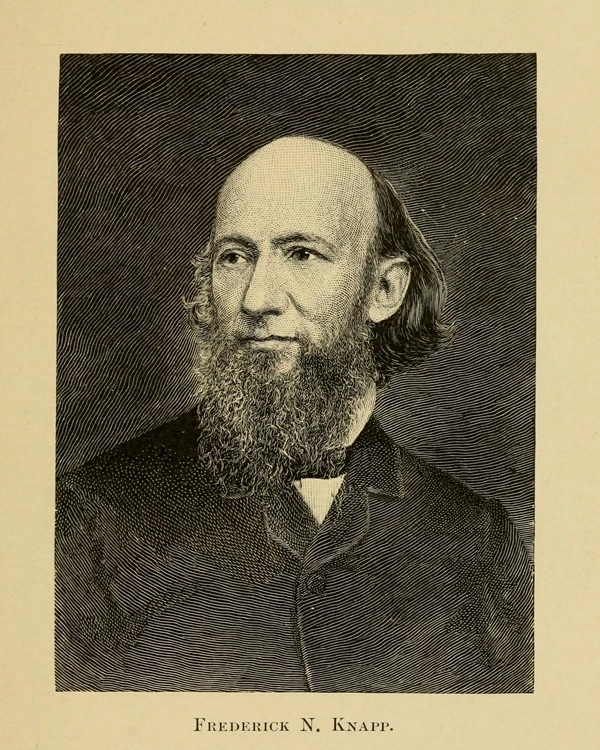Last updated: January 6, 2026
Person
Frederick N. Knapp

"The Cruel Side of War" by Katharine Prescott Wormeley, 1898.
Clergyman Frederick Newman Knapp served on the Boston Vigilance Committee and, later, the United States Sanitary Commission.
Born in Jamaica Plain, Massachusetts, in 1821, Frederick N. Knapp spent much of his childhood in Walpole, New Hampshire. He attended Phillips Academy, then Harvard College which he graduated from in 1843. Four years later, he finished his training at the Harvard Divinity School. Knapp served as a Unitarian minister in Brookline, Massachusetts, beginning in 1847. He married his wife Lucia Alden Bradford in 1855 and soon began a family with her.1
Following the passage of the 1850 Fugitive Slave Law, Knapp also joined the Boston Vigilance Committee, an organization that assisted freedom seekers on the Underground Railroad. Though his name does not appear on the official broadside listing members of the organization, it is included on committee member Austin Bearse's "Doorman’s List." Among other duties, Bearse watched the doors at committee meetings and only allowed known members in. The treasurer of the Vigilance Committee, Francis Jackson, recorded a $10 donation by Knapp in July 1851, to support the work of the group. Other than this donation, however, Knapp’s other contributions to the committee remain unknown.2
An accident and subsequent illness forced Knapp to resign from his church in Brookline in the mid-1850s. He returned to Walpole, New Hampshire, to recover.3
During the Civil War, Knapp served in the United States Sanitary Commission, a relief organization that aided the war effort. Known as one who "organized and controlled with masterly zeal, humanity, and success," Knapp helped an estimated fifty thousand soldiers through his efforts. For his leadership and actions during the war, the Grand Army of the Republic made him an honorary member.4
Following the war, Knapp worked as a principal in a military school in New Jersey. He later established a Home School for Boys in Sutton, Massachusetts. He ultimately settled in Plymouth, Massachusetts, where he worked as a minister for a time, as well as heading the School for Boys there.5
Knapp passed away in Plymouth in 1889. One account fondly remembered him, stating:
He never ceased to think and act for others, and countless deeds of thoughtful kindness still serve to keep his memory fresh in the hearts of those who loved him. His Christianity was not confined to the pulpit, or to pastoral cares, but pervaded his social duties, and the obligations of citizenship.6
His remains are buried in Oak Grove Cemetery in Plymouth.7
Footnotes:
- William H. Lyon, Frederick Newman Knapp, Sixth Minister of the First Parish in Brookline, 1847-1855: A Sermon preached in the First Parish Meeting House November 22, 1903 (Brookline: Published by the Parish, 1904), 6-7; Patrick Browne, "Frederick N. Knapp, A Different Sort of Civil War Hero," Frederick Newman Knapp | Historical Digression; Arthur Mason Knapp, George B Knapp, and Katherine Knapp, eds. The Knapp family in America : a genealogy of the descendants of William Knapp who settled in Watertown, Mass., in 1630 : including also a tabulated pedigree, paternal and maternal, of Hiram Knapp (Fort Hill Press: Boston, 1909), 48-49; The National Archives in Washington, DC; Record Group: Records of the Bureau of the Census; Record Group Number: 29; Series Number: M432; Residence Date: 1850; Home in 1850: Brookline, Norfolk, Massachusetts; Roll: 331; Page: 89a.
- Austin Bearse, Remininscences of Fugitive Slave Law Days in Boston (Boston: Warren Richardson, 1880), 4; Dean Grodzins, "Constitution or No Constitution, Law or No Law: The Boston Vigilance Committees, 1841-1861," in Matthew Mason, Katheryn P. Viens, and Conrad Edick Wright, eds., Massachusetts and the Civil War: The Commonwealth and National Disunion (Amherst: University of Massachusetts Press, 2015), 73, n.57.; Francis Jackson, Account Book of Francis Jackson, Treasurer The Vigilance Committee of Boston, Dr. Irving H. Bartlett collection, 1830-1880, W. B. Nickerson Cape Cod History Archives, https://archive.org/details/drirvinghbartlet19bart/page/n3/mode/2up, 23.
- Patrick Browne, "Frederick N. Knapp, A Different Sort of Civil War Hero."
- "The Rev. Frederick N. Knapp," New-York Tribune, January 13, 1889, 3; Arthur Mason Knapp et al, 48-49.
- "The Rev. Frederick N. Knapp," New-York Tribune, January 13, 1889, 3; Arthur Mason Knapp et al, 48-49.
- John Cuckson, A brief history of the First Church in Plymouth, from 1606 to 1901 (Boston: G.H. Ellis, 1902), 96-97.
- “Rev Frederick Newman Knapp (1821-1889)," Find a Grave Memorial.
